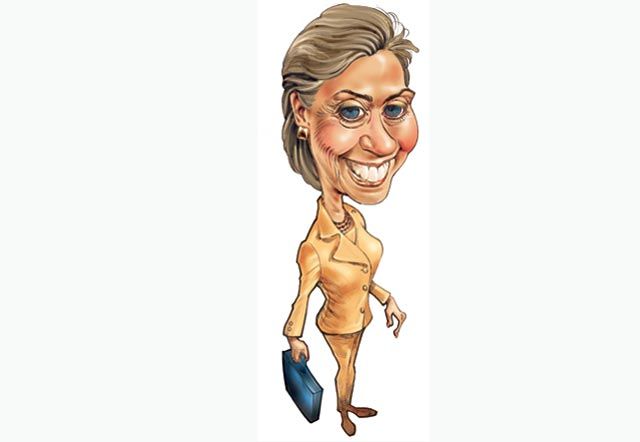Last week, US Secretary of State Hillary Clinton raised eyebrows when she differentiated between the military and political branches of Hezbollah. Clinton's statement on the Charlie Rose show came only 24 hours after Sa'ad Hariri had formed a Cabinet of national unity, which includes two members of Hezbollah.
Clinton was seemingly offering a life jacket to Hariri by saying that while the US frowns on the military wing of Hezbollah that engages in war, the political branch is acceptable.
Never since the US declared Hezbollah a terrorist organisation in 1999 has a senior US official made such a groundbreaking statement about Hezbollah.
The US has obviously realised that no breakthrough is possible in Lebanon unless Hezbollah is represented in the Cabinet. Some call it pragmatism; others say that it was a difficult reality that Washington has had to digest.
Fighting with Hezbollah achieves nothing — as can be seen from the mini war that broke out in Beirut in May 2008 — and trying to disarm it through UN resolutions was obviously not going to work.
The Obama administration has decided to deal with Lebanon on a macro level, evaluating results rather than immersing itself with details. It has far more pressing issues to deal with, such as the explosive situation in Afghanistan, Iraq and Palestine.
Hariri has, therefore, been given carte blanche to deal with Hezbollah as he sees fit. As a result, Hezbollah's demands were met: they got to name the Shiite minister in President Michel Sulaiman's bloc, were given control of 11 rather than 10 portfolios, and their ally Charbel Nahhas of the Free Patriotic Movement was named as minister of telecommunications.
This week, the new prime minister is due to deliver a policy statement for his new government. Hezbollah expects, based on Hariri's promises, that this will include a clear statement of support for Hezbollah's right to bear arms.
Harirism
The March 14 Alliance has invented a new term in the ever-changing political lexicon of Lebanon: Harirism. This is defined as continuity along a path paved for Lebanon by Rafik Hariri, Sa'ad's father.
This basically applies to attracting foreign investment, building the economy, transforming Lebanon into a tourism hub, incorporating all parties into the political process and continuing to invest in what was previously known as West Beirut.
Hezbollah is seeking to convince the Hariri team that Harirism also depends on an excellent relationship between Hezbollah and the premiership. This was achieved in the past, they say, by including a clause in every government policy statement since 1992 recognising Hezbollah's role as the legitimate resistance in Lebanon against Israel.
Hezbollah seeks to remind Sa'ad Hariri of a conversation between Hassan Nasrallah and Rafik Hariri that supposedly took place one week before the latter's assassination in February 2005.
According to Nasrallah, Hariri said, "I believe in this resistance. And I am telling you that if I become prime minister again I will not implement the [disarmament] article of [UN] Resolution 1559. I swear to you that the resistance and its weapons will remain until the day a comprehensive regional settlement is reached, not just until [the Israeli] withdrawal from the Sheba Farms."
Lebanon is sharply divided over Hezbollah's right to bear arms. The topic surfaced after the withdrawal of Syria from Lebanon in April 2005, only to be briefly muted, then re-emerged right after the Israeli war on Lebanon in August 2006.
Today, two ministers of the Hariri Cabinet, Boutros Harb and Salim Al Sayegh, are insisting that the word ‘resistance' is not included in the policy statement of the new government, sending shockwaves through the upper echelons of Hezbollah.
The two ministers are objecting to Section 5 of the proposed Government Agenda, which recognises Hezbollah's right to weapons. If Hezbollah gets its way this time, the Lebanese Phalange is threatening to walk out on Hariri.
Sejaan Qazzi, a senior member of the Phalange, stressed that his party's MPs should be considered "an independent parliamentary bloc," which does not abide by the decisions of the parliamentary majority.
Nothing indicates that the new crisis is close to being solved. The Phalange insists that it will not endorse a Cabinet that recognises Hezbollah's right to weapons. For its part, Hezbollah is saying that its arms are not up for negotiation, reminding that it agreed to join Hariri's government believing that it would adopt the same policy statement of his predecessor, Fouad Siniora.
Sa'ad Hariri is now faced with the first real challenge of his new term as prime minister. The Phalange helped bring him to power, but Hezbollah's support is essential for his success.
Perhaps Clinton has pointed him in the right direction by signalling that a content Hezbollah, well represented in government, is better than an angry one on the offensive, leading anti-Hariri demonstrations and waging war on Israel.
Sami Moubayed is editor-in-chief of Forward Magazine in Syria.













